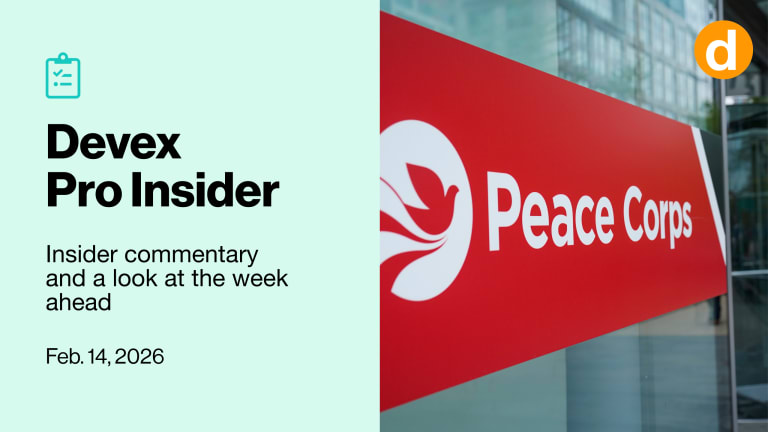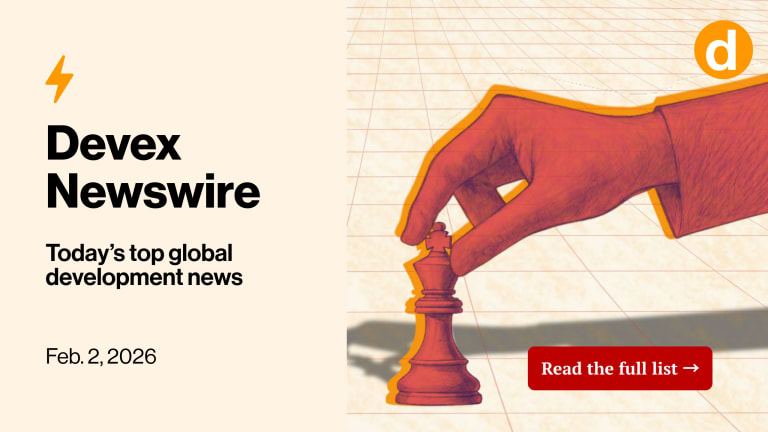Presented by Mastercard Foundation

I’ll say one thing for the Department of Government Efficiency: It’s got a flair for the theatrical, even when it comes to small, seemingly obscure organizations.
Also in today’s edition: Will the prospect of Beijing hosting the World Bank keep U.S. President Donald Trump from dumping U.S. shares in the bank?
This is a preview of Newswire
Sign up to this newsletter for an inside look at the biggest stories in global development, in your inbox daily.
+ Happening soon at 10 a.m. ET (3 p.m. CET): The foreign aid freeze hindered critical food assistance, despite exemptions. Join our live panel to hear firsthand accounts and discuss the impact, repercussions, and practical insights. Save your spot now.
Who let the DOGE in?
The Trump administration’s determination to shut down the U.S. African Development Foundation, the Inter-American Foundation, and now the U.S. Institute of Peace is both relentless and dramatic.
Except USIP is different from the other two in that it’s an independent nonprofit, not a government agency. That didn’t deter DOGE from barging into its headquarters in Washington, D.C. — the first time on Friday afternoon, when DOGE representatives and two FBI agents were turned away.
But if at first you don’t succeed …
On Monday afternoon, USIP’s acting president and CEO, George Moose, put out a one-line statement that “DOGE has broken into our building.” A few hours later, the cost-cutting organization did indeed breach the building, posting on X a letter from three of USIP’s board members stating they were removing Moose and that Kenneth Jackson — USAID’s assistant to the administrator for management and resources — had taken his place.
“The only unlawful individual was Mr. Moose, who refused to comply, and even tried to fire USIP’s private security team when said security team went to give access to Mr. Jackson,” DOGE stated on X, the social media platform owned by DOGE chief Elon Musk, noting that D.C. police “arrived onsite and escorted Mr. Jackson into the building.”
Moose’s firing, however, is in direct opposition to the U.S. Institute of Peace Act, which states that USIP board members must be confirmed by the Senate. Since its founding in 1984 under Republican President Ronald Reagan, USIP has described itself as a nonpartisan, independent entity focused on protecting American interests by preventing violence and promoting peace.
Read: DOGE 'breaks into' the US Institute of Peace
ICE squad
U.S. immigration agents have on multiple occasions approached and ordered U.N. employees to show proof that they are in the United States legally, according to an internal March 13 U.N. email from a senior U.N. security officer, my colleague Colum Lynch scoops. None have faced detention or deportation.
The email — which carried the subject line: “Proof of Identity if Stopped by Authorities in NY” — counsels U.N. workers to carry their passports and G4 visas at all times. The U.S. grants G4 visas to workers at international agencies and their families.
“There have been several incidents, reported by other agencies, where UN personnel have been stopped [by] US authorities identifying themselves as ICE agents,” the email stated, referring to U.S. Immigration and Customs Enforcement. “Staff have been asked to identify themselves and prove their residency status. In all cases staff were allowed to carry on once they showed their passport with the valid G4 visa.”
Neither the United Nations nor ICE responded to requests for comment.
ICYMI: Trump's new 'loyalty test' for UN and aid groups
Banking on Beijing?
With USAID dismantled and staring into the abyss, the aid community is anxiously awaiting what might be next on the chopping block. While the general sentiment is that Trump wouldn’t go so far as to pull out of the World Bank, almost no one predicted he would get rid of USAID either.
But there’s one intriguing catch if the U.S. does withdraw: The headquarters of the bank would then migrate to the largest shareholder. Right now, that’s Japan, followed by several large European nations. But if the bank were to recapitalize, some experts say China would be eager to become the largest shareholder, thereby snatching the headquarters away from Washington, D.C., and moving it — along with all the influence and cachet it carries — to Beijing.
But not everyone thinks that’s plausible. For one thing, the prospect of relocating the bank to Beijing could actually be seen as leverage for Trump to not withdraw, given his geopolitical rivalry with China.
“It is inconceivable to me that the U.S. would vote for a capital increase that makes China the largest shareholder and then ship the headquarters to Beijing,” Kevin Gallagher of Boston University tells my colleague Jesse Chase-Lubitz.
For another thing, China already has the Asian Infrastructure Investment Bank headquartered in Beijing.
“[China] has never said we want to take over the World Bank,” Gallagher points out. “They've just created an apparatus on the side that is bigger.”
So could Europe step into the breach?
“Hopefully [Europe] has been stunned enough on the security and the NATO story to realize that they really have to get their act together and work with the Japanese,” Gallagher says. “If they took a proactive approach, you could see a Western consortium that bought up the shares.”
Read: Could the future of the World Bank be outside of Washington? (Pro)
ICYMI: Could the US pull out of the World Bank? Unlikely — but not impossible
+ Not yet a Devex Pro member? Start your 15-day free trial today to access all our expert analyses, insider insights, funding data, events, and more. Check out all the exclusive content available to you.
The Trump tradeoffs
“There are some terrible choices to be made.”
— Dr. Mike Ryan, deputy director general, WHOUnlike the World Bank, Trump’s withdrawal from the World Health Organization was no surprise. Now, WHO, like the legions of entities reliant on U.S. funding, is making agonizing decisions over what to keep and what to cut in the wake of the Trump administration’s foreign aid retrenchment.
Ryan, who also serves as WHO’s executive director of the health emergencies program, said the organization has already scaled back its health emergencies two-year budget from $1.2 billion to $872 million.
“Now, contracting by 25% to 28% sounds easy on paper. But the question is, what do you want to stop doing? You want to stop doing Ebola? You want to stop doing emergency medical teams responding to major disasters in the world? Would you like to stop intelligence gathering so that we know what the next epidemic or pandemic will be?” Ryan told reporters yesterday.
The U.S. government is WHO’s biggest donor, providing over $1.2 billion from 2022-2023. But in January, Trump announced he is withdrawing the U.S. from WHO, leaving behind a gaping financial hole for the U.N. agency, my colleague Jenny Lei Ravelo writes.
WHO has since taken various belt-tightening measures, including a hiring freeze, reducing travel, and offering early retirement. Member states have also asked the agency to do a reprioritization exercise and present a reworked budget at the World Health Assembly in May.
For his part, Ryan sounded resigned yet determined.
“We want [the U.S.] still involved in global response and global prevention. We need them to be still involved. But we may have to move on without them and without those resources. If we have to, we will be strong. We will survive.”
Read: With US funding loss, WHO forced to make 'terrible' programmatic choices
Boys club
The WHO regional office for Africa found itself in an unprecedented and tragic situation last November. Three months after Tanzanian politician Dr. Faustine Ndugulile won the election to become the new regional director, he unexpectedly died while receiving medical treatment in India.
Instead of having an election with the previous set of four candidates, WHO put out a new call for African governments to put forward new options. My colleague Sara Jerving has a detailed breakdown of each prospect, though they all have something in common: All five are, once again, men.
Dr. Githinji Gitahi of Amref Health Africa says the continent has “so many deserving women, but their governments haven’t found it worthy to nominate them to compete equally with their male counterparts.”
“[It] shows we still have a long way to closing the gender gap in global health leadership.”
Read: WHO releases candidates for its top job in Africa; none are women, again
+ For more content like this, sign up for Devex CheckUp, our free, weekly global health newsletter.
In other news
International donors pledged nearly €6 billion for Syria during a one-day conference in Brussels to encourage a peaceful political transition for the conflict-ravaged country. [AP]
The Food and Agriculture Organization warned unprecedented H5N1 avian flu spread is decimating global bird populations and threatening food security and supply in countries. [UN News]
The suspension of USAID funding is straining vital health, demining, and education programs across Southeast Asia, giving China an opportunity to expand its influence. [Nikkei Asia]








